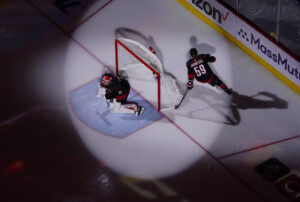Post-season heroes come in all forms, from the star player to the unknown fourth-liner. We all know the exploits of the great playoff performers. However, we hardly hear about the unlikely playoff heroes. These unlikely post-season stars can contribute in many ways. Contributions could be for an entire playoff run, a series, a game or even a goal. These unlikely heroes have made big plays that no one expects. This series looks at all of these unknown stars. These are the unlikely Montreal Canadiens playoff heroes.
Montreal Canadiens Playoff Heroes
Eric Desjardins
Before the Moment
Eric Desjardins was drafted by the Montreal Canadiens in the second round (38th overall) of the 1987 NHL Entry Draft. He made his Canadiens debut in the spring of 1989, just in time for the Habs run to the Stanley Cup Finals. Desjardins would play 14 games in the 1989 playoffs but the Habs would come up short of winning the Stanley Cup.
Desjardins would establish himself as one of the Habs’ top defencemen in the following three seasons. While he played important minutes for the Habs, Desjardins was never a big point producer. He had not scored more than seven goals or scored more than 38 points. In 1992-93 however, Desjardins did have an offensive breakout, scoring 13 goals and 45 points. Unfortunately, Desjardins’ newfound offensive touch did not follow him into the postseason. Through the Habs first 16 games, he only had one goal.
The Moment
In Game 2 of the 1993 Stanley Cup Finals, the Habs were looking to rebound after dropping Game 1 to the Los Angeles Kings. Desjardins opened the scoring late in the first period. The Kings Dave Taylor tied the game with a shorthanded goal in the second. Midway through the third, the Kings took a 2-1 lead through Pat Conacher.
With the Habs starring down a 2-0 hole heading to LA, the Canadiens were desperate. Coach Jacques Demers called for a stick measurement on Kings defenceman Marty McSorley. With McSorley in the box, Demers also pulled Patrick Roy to give the Habs a 6 on 4 advantage. With just over a minute to go, Desjardins tied the game with a shot from the point. The game went to overtime, where 51 seconds in, Desjardins scored the game-winner and completed his hat trick.
The Habs broke into the Kings zone two on two, but Desjardins jumped into the rush as the trailer to make it a three on two. Benoit Brunet dropped the puck back to Desjardins who fired his shot over the net. Brunet was able to collect the puck behind the net and keep the play alive. Desjardins had begun to circle back to his defensive position but saw Brunet recover the puck. He jumped back into a shooting position and with the Kings scrambling, collected the pass and slid the puck past Kings goalie Kelly Hrudey to win the game and tie the series. To date, he is the only defenceman to score a hat trick in the Stanley Cup Finals.
The Aftermath
Game 2 swung the series momentum in the Habs favour. They would win the Stanley Cup in five games. Desjardins’ time with the Habs, however, was not long-lived.
He was traded to the Philadelphia Flyers in 1995. Desjardins would play with the Flyers for the next 10 seasons until he retired in 2006. He was able to find his offensive game with the Flyers. In his ten years with the Flyers, Desjardins’ 396 points rank second all-time in scoring by a Flyers defenceman. He would win the Barry Ashbee Trophy seven times as the Flyers’ top defenceman and was inducted into the Flyers Hall of Fame in 2015.
Claude Lemieux
Before the Moment
Claude Lemieux was drafted by the Canadiens in the second round of the 1983 NHL Entry Draft. He made his NHL debut in the 1983-84 season playing eight games. Lemieux joined the Habs for good in 1985-86. In ten games he scored one goal and three points. While his production was nothing to write home about, he was about to give the NHL a sample of what to expect from the super-pest in the playoffs.
The Moment
Lemieux exploded in the playoffs for the Canadiens. The rookie finished second in team scoring with 10 goals and 16 points in 20 games. His 10 goals led the team. While those numbers might not blow people away, it was the importance of his goals. Lemieux scored four game-winners, including an overtime goal in Game 7 of the Adams Division Final against the Hartford Whalers. He also scored an overtime goal in Game 3 of the Wales Conference Final against the New York Rangers.
While he only scored one goal in the Stanley Cup Finals, it was the only goal scored in Game 4, a 1-0 Canadiens win. The win gave the Habs a 3-1 series lead, which they would eventually win in Game 5. While his production was impressive and timely it was also his rugged pest style game that made him effective. His game was well suited for the rigours of the NHL playoffs.
The Aftermath
In his first full season with the Canadiens, Lemieux impressed, with 27 goals and 53 points. He would score 31 and 29 goals in the following seasons with the Habs. In 1990, Lemieux was traded to the New Jersey Devils. He would continue his strong play by notching 30, 41, and 30 goals in his first three seasons in New Jersey. His production took a dip in 1993-94 but was a key part of the Devils’ surprising run to the Eastern Conference Finals in the 1994 Stanley Cup Playoffs. He scored seven goals and 18 points in 20 games. In the 1995 playoffs, Lemieux scored 13 goals and 16 points to lead the Devils to their first-ever Stanley Cup. He was awarded the Conn Smyth Trophy as the playoff MVP.
Prior to the 1995-96 season, Lemieux was traded to the Colorado Avalanche in a three-team trade. With Colorado, Lemieux posted 39 goals and 71 points. In the playoffs, Lemieux scored five goals and 12 points in 19 games as the Avalanche won their first Stanley Cup. After four seasons in Colorado, Lemieux was traded back to the Devils in 2000. Coincidentally, the Devils would win their second Stanley Cup that year. Lemieux would play five more seasons with the Arizona Coyotes, Dallas Stars and San Jose Sharks, as well as in Europe, before retiring in 2009.
Brian Skrudland
Before the Moment
Brian Skrudland went undrafted after three seasons with the Saskatoon Blades of the WHA. He was signed by the Canadiens and joined their AHL affiliate in Nova Scotia for the 1983-84 season. In his second year with the then Sherbrooke Canadiens, Skrudland scored 22 goals and 50 points. The Canadiens won the Calder Cup and Skrudland was named the AHL playoff MVP. Skrudland joined the Montreal Canadiens for the 1985-86 season.
His role with the Habs was a defensive one. Skrudland scored nine goals and 22 points in his rookie campaign. He quickly established himself as a tough and hard player to play against. The Habs made the playoffs in 1986 but not much was expected of them. They qualified in second place in the Adams Division with 87 points. Despite their record, the Habs were able to ride rookie goalie Patrick Roy all the way to the Stanley Cup Finals.
Game 1 saw the Calgary Flames handle the Habs 5-2 to take a 1-0 series lead. This set the table for a Game 2 the Habs desperately needed to win.
The Moment
The Flames jumped out to a 2-0 lead very early into the second period of Game 2. With the Habs facing an 0-2 hole, the Canadiens were able to pull even with the Flames early in the third period. Setting the stage for overtime. Before anyone could set in, Brian Skrudland scored nine seconds into the extra frame to give the Habs the win and tie the series. Off the face-off, the puck bounced around the neutral zone, before the Habs gained control. Mike McPhee grabbed the puck and was on a two on one with Skrudland. After faking a shot, McPhee passed it to Skrudlund who tipped it past Flames goalie Mike Vernon to win the game.
It is still the quickest overtime goal in Stanley Cup Finals history. It was Srkudland’s first goal of the postseason and his first-ever playoff goal. The goal turned the tide for the Habs as they did not lose another game.
The Aftermath
As mentioned, the Habs would win the 1986 Stanley Cup in five games. Skruland was able to score another key goal in the series, notching the Habs second goal in Game 5.
Skrudland was never a flashy player. He would contribute around 12 goals a year but he would excel in the defensive aspects of the game. He was able to play big minutes at even strength and short-handed. Skrudland had a high hockey IQ and was rarely caught out of position. He also played a physical game which eventually took a toll on his body. He began to break down by the 1990 season and would frequently miss games with injuries.
Skrudland was traded to the Flames during the 1992-93 season. His time in Calagary lasted 16 games (and six playoff games) as he was claimed by the Florida Panthers in the 1993-94 Expansion Draft. Skrudland’s leadership and smart play helped the Panthers make an unlikely run to the 1996 Stanley Cup Finals. Skrudland signed with the Rangers for the 1997-98 season. It was another short stint for Skrudland in New York as he was traded to the Dallas Stars near the end of the season. Skrudland would play two more seasons in Dallas, winning his second Stanley Cup in 1999. He would retire from hockey following the 1999-2000 season.






